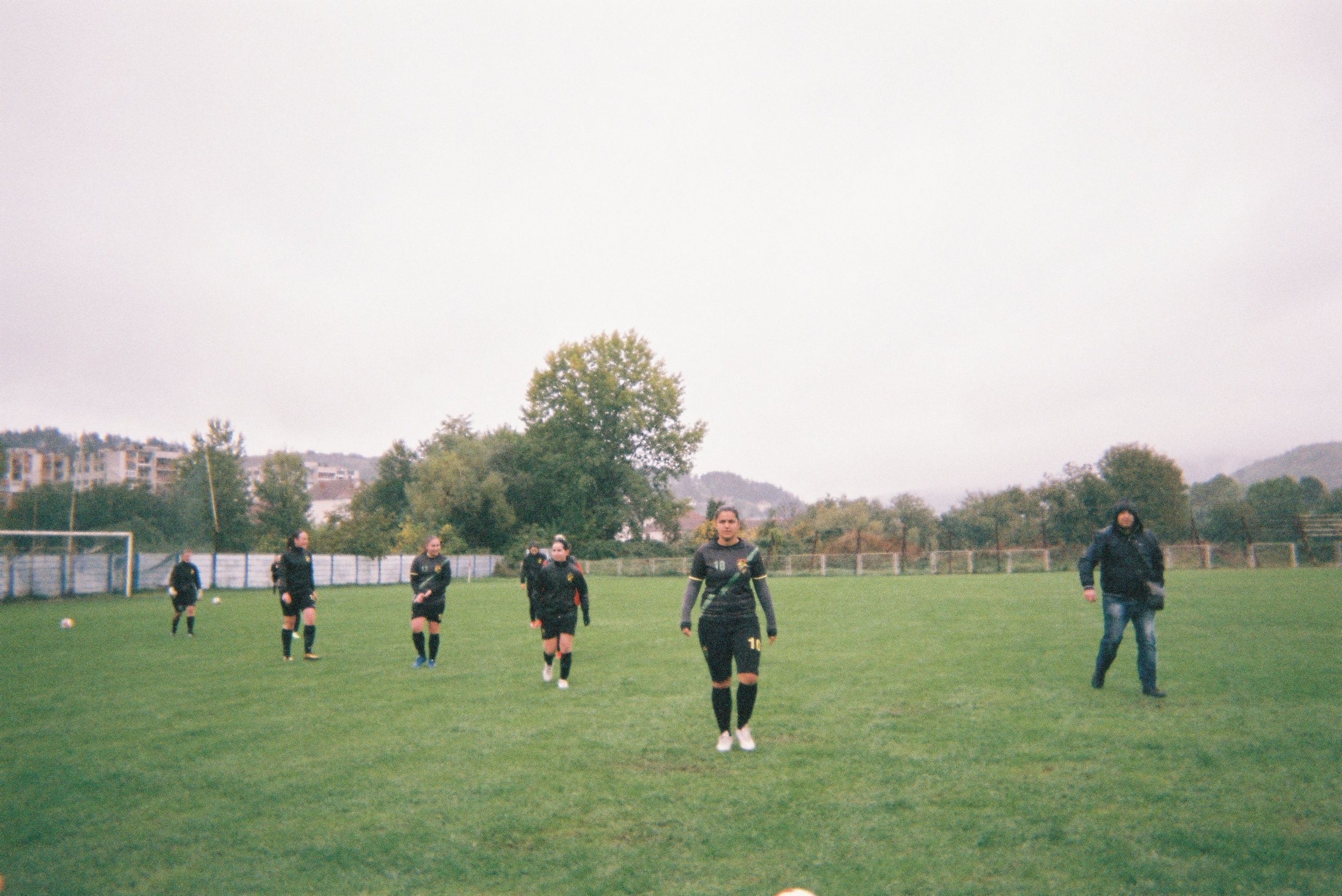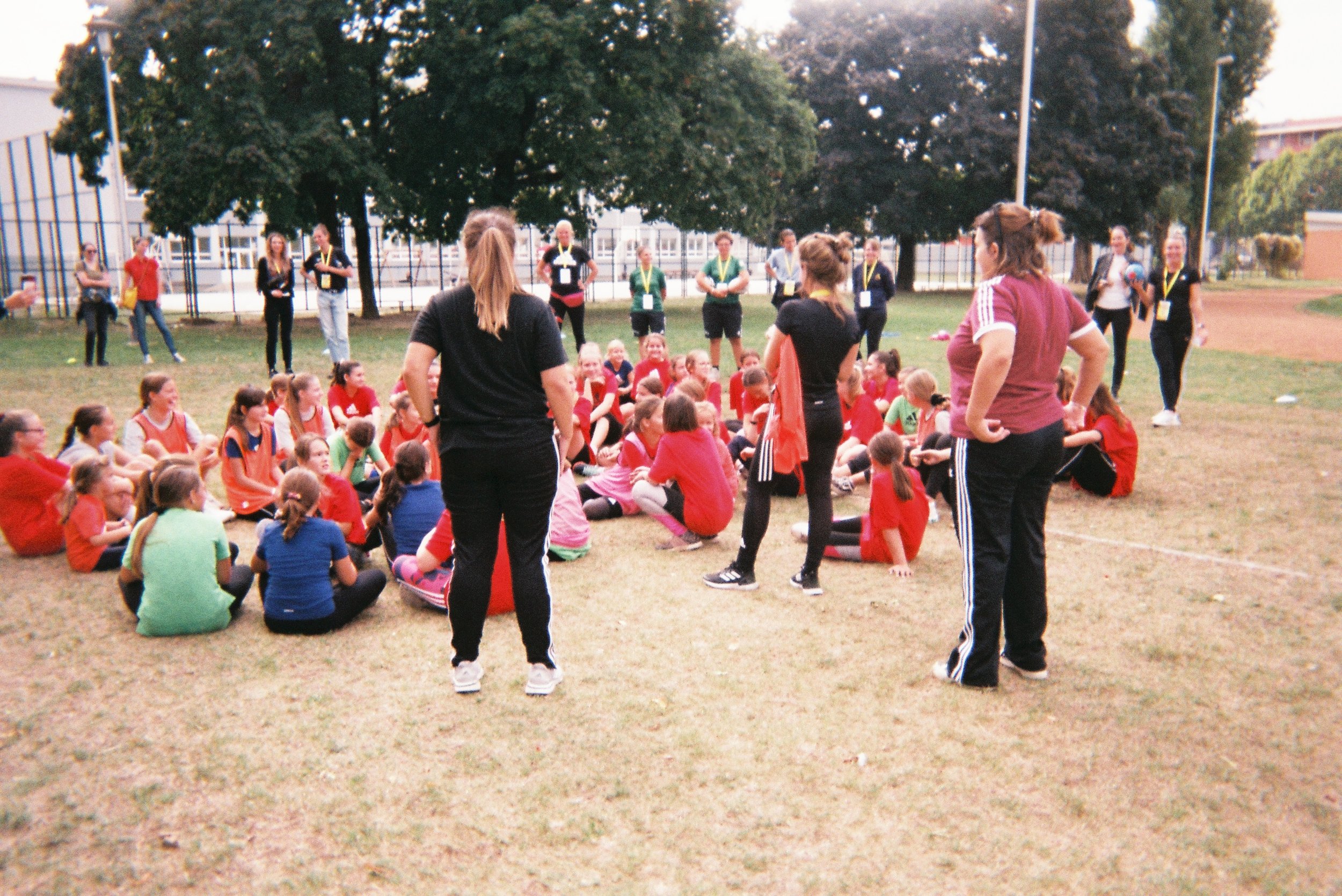An Obsession, A Passion, A Dream
Emilija Smiljkovic, Serbia
We have teamed up with the adidas Breaking Barriers Project to tell the stories of six coaches and leaders from sports organisations across Europe - from Spain, Netherlands, Croatia, Serbia, and Italy. The project empowers women to undertake leadership training which helps to break the barriers that girls across Europe face, giving them easier access to sport. Emilija Smiljkovic is a coach with CCPA (Cross Cultures Project Association) in Serbia.
Can you introduce yourself and tell us about your football journey?
My name is Emilija Smiljkovic. I am from Serbia but have been working as a football coach in schools in the UAE since June 2022. I am a former football player and was the coach for WFC Majdanpek and the U15 girls team of SF Popaj 18 in Serbia. I am also an instructor for CCPA (Cross Cultures Project Association) with the Open Fun Football School project. I was one of the first group of Champions for the adidas Breaking Barriers Project.
I started playing when I was 3 years old, believe it or not. I have a picture from my first touch with a football. My coaching career started when I was 20 years old. I come from a small town called Knjaževac in the east of Serbia, so there are plenty of challenges and difficulties with this - from the fact that a “woman cannot be a coach”, that I am “too young”, that football is “not for me”, that “a man has to lead a football club”.
Over the course of my coaching career, I encountered many injustices. I created a team from scratch and developed it to play competitive baraž matches. Then the President of the club told me I would be replaced by a more "experienced" coach (his good friend). However, it was never a problem for me. I always go headfirst through the wall and always will. Now my whole town knows that when I set my mind to something, I can achieve it. I was always able to form a new club within a month or two, and to easily gather children who want to play with me and for me.
What did you try to capture with your photos and was there any wider meaning? What do these images mean to you as a champion of the adidas Breaking Barriers Project?
The photos were taken in Majdanpek and Knjazevac in Serbia. I wanted to show my teammates and the girls I coach. I tried to show the atmosphere in the team and interesting moments.
Someone somewhere will see a part of me and a part of my life. That is a big thing for me, because I always wanted to show to the world that somewhere in little Serbia there is someone for whom football is everything, an obsession, a passion, a goal, a life.
There is a photo of 11 players warming up for the game. It was 3 degrees, during a heavy downpour, and on a terrible field. One of them has an exam at the university tomorrow. One has two children and a husband who are waiting for her at home. One took sick leave from work to come to play the game. One closed her shop to come. One left her sick mother at home. Two travelled 900km by bus, came, froze, got wet, some a cold and returned home. This shows how much girls love football without being paid.
What role does football and sport play in your community and Serbian society?
Football is very important in my community, a matter of prestige one could say. Every boy in my community wants to be a football player. I try to make as many girls as possible truly love the sport, despite all the obstacles I encounter.
Serbia is a country that adores football, although in other sports we have much more success as a national team (basketball, water polo, volleyball). No sport is more loved and adored than football in Serbia. It is just like that, nobody knows why. Even though our national team has disappointed us many times, Serbs are people who love football. It is in our blood, I guess. Every Serbian wants his child to be a football player, or to be a coach, or manager.
What are the opportunities for women and girls to play football in your community and in Serbia?
As far as women's football in Serbia is concerned, it seems at first glance to have made a lot of progress and a lot more people are entering women's football. However, those of us who have been here for many years know that women's football is in a very bad state. It all comes down to money and to the people (presidents, secretaries, coaches) who appear only and exclusively for money. None of them are interested in the progress of girls, clubs, and the progress of women's football. In my community, only me and my brother are fighting for women's football, and you can see the state of it.
What impact has the adidas Breaking Barriers Project had on your journey as a leader and change-maker?
The adidas Breaking Barriers Project had a strong influence on me. It empowered me to take things into my own hands, to accept the fact that I am a leader and an idol to young girls, that I can do much more than I think, and that I can achieve all my goals. This led me to a new job in the UAE. I am proud of the fact that I am one of the 30 Champions from the first group who had the privilege and honour to mature and grow with such a project.
How important are the people and the community of CCPA to you?
The people from the CCPA community are very important to me. They showed me some new hopes, paths, and goals. In particular Vildana Delalić Elezović, the coordinator of the CCPA for the Balkans, who was always there for me, gave me the chance to be a part of such a great organisation, helped me in various challenging situations, and encouraged me when needed. CCPA is responsible for where I am now and that I enjoy my work and life.
What does football mean to you? What ambitions do you have for the future?
Football is an obsession, a passion, a journey, a dream, my life. Football is in my veins, in my brain and in my heart. My biggest wish is to be involved in football for many more years in any country, anywhere to contribute to the development of young talents and the development of football.
What do you think the future looks like for football in your community and country? What do you want to change? How would you improve gender equality?
Unfortunately, in my community and country, football cannot progress for the simple reason that the wrong people are in top positions. Football in our country is not played by players, coaches, and clubs, it is played by referees and federations. In our country it is known in advance who is relegated from the league and who will come first.
If I had the power to change something, I would first appoint young, honest, sincere people to top positions - people who love football and who want the best for it. That would only lead to the progress of Serbian football.
As far as gender equality is concerned, Serbia is still far from what it should be. Serbs as a nation are the strongest at prejudices and stereotypes. Considering that Serbs only recognise money as the measure of everything, the thing that would lead to gender equality is the equalisation of "men's" and "women's" football in every sense (TV rights, pitches, salaries, managers) but unfortunately that will not happen in Serbia anytime soon - if it ever happens!
To learn more about the adidas Breaking Barriers Project, visit: https://www.adidas.co.uk/breakingbarriers
Series edited by Emma Walley.













